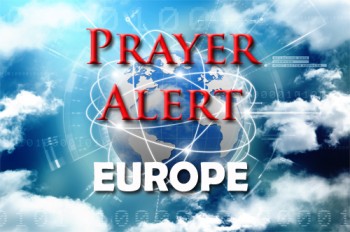Displaying items by tag: antiSemitism
Germany: Jews told not to wear skullcaps
A skullcap, sometimes called a kippah or yarmulke, is a cap worn by some male Jews under religious rules that say their heads should be covered. Commissioner Felix Klein, the German government's top official against anti-semitism, has warned Jewish people not to wear skullcaps in parts of the country because of a rise in anti-Semitic attacks. Mr Klein told the Funke newspaper group, ‘My opinion has unfortunately changed compared with what it used to be. I cannot recommend to Jews that they wear the skullcap at all times everywhere in Germany.’ According to statistics released earlier this month, anti-Semitic incidents were up by 19.6% to 1,799 in 2018, with 89.1% of them involving far-right perpetrators. Israeli President Reuven Rivlin said he was deeply shocked by Mr Klein's words. He added, ‘We will never submit, will never lower our gaze and will never react to anti-semitism with defeatism - and expect and demand our allies act in the same way.’
Brexit, Corbyn and anti-Semitism
Some say Labour could capitalise on the Brexit delay and sweep into power, with Leave-supporting voters turning their backs on the Conservatives over the Brexit interruption. Labour would then become the largest party in the Commons, with a substantial majority. Surveys taken between 2 and 11 April put support for Conservatives at its lowest for five years. A week later backbenchers have urged Corbyn to shift his stance and commit to a Brexit vote, or he might let Nigel Farage snatch a shock European election victory with his new Brexit Party. Meanwhile he has been criticised for Labour's handling of anti-Semitism. Media reports of internal documents showed that the party had failed to take disciplinary action in hundreds of anti-Semitism cases. The Jewish Labour Movement passed a no-confidence vote in him. See
Holocaust memorial in Westminster under threat
Plans for a new Holocaust memorial and learning centre in Westminster are currently being strongly opposed. The plans, first announced by David Cameron in 2016, have the backing of every major UK Jewish organisation and 170+ politicians from all political parties. A growing number of people in this country, especially the younger generation, know nothing or very little about the Holocaust, so a vital education centre for that generation risks being lost. The memorial will use 7% of the park, with the education centre underground. Whilst many genuinely oppose the construction without discriminatory motives, there is evidence of anti-Semitism from some opponents. A petition to save the memorial has been posted online, because it ‘could be stopped if we fail to act before the end of March.’
Pittsburgh synagogue shooting: ‘love, not hate’
2,500 people attended a vigil at a memorial hall and 1,500 stood outside in the rain, listening to loudspeakers, the day after an anti-Semite murdered eleven people and injured six in their place of worship on 27 October, their Shabbat. ‘We need love, not hate’, said the CEO of the Jewish Federation of Greater Pittsburgh. The Bishop of the Episcopal Church, Michael Curry, the Archbishop of Canterbury, and others stood by the Bishop of Pittsburgh whose response to the shooting was, ‘This terror is added to the heap of such crimes we have witnessed in the past. Yet our hope is not dimmed. “Behold, I set before you this day, life and death, blessing and curse: therefore choose life, that you and your descendants may live’’ (Deuteronomy 30:19).’ See
The CofE in Parliament
On 13 September 2018 the House of Lords debated a motion from Lord Popat, ‘to ask Her Majesty’s Government what actions they are taking to reassure the Jewish community over the impact of anti-Semitism in the United Kingdom.’ David Urquhart, the Bishop of Birmingham, said, ‘There is a need for constant vigilance to ensure that anti-Semitism plays no part in the life of our country’. A further report on the theology of Christian-Jewish relations is in preparation, led by the Bishop of Lichfield.
Anti-Semitism in politics
In February we reported that anti-Semitic hate crimes in the UK had hit a record high, prompting prayers for more visible and frequent prosecutions for such incidents. The Jewish community was targeted almost four times a day last year, which also saw the highest tally of incidents since data gathering began. Three-quarters of all anti-Semitic incidents were in London and Manchester, where most Jewish communities live. Hatred is rising, and Jewish people are suffering as a result. This should concern everybody because it shows anger and division, threatening all society. In 2015 the international community agreed on a definition of anti-Semitism. The UK’s Labour party has not signed up to it, saying its own code of conduct already covers the definition. On 23 July Labour MPs and peers backed the international definition. Jeremy Corbyn disagrees.
Lord Sacks challenges the nation
Lord Sacks recently commented on Radio 4, ‘I have been doing Thought for the Day for thirty years, and never thought that in 2018 I would still have to speak about anti-Semitism’. He was born after the Holocaust and recalled people saying ‘never again’. But in 2018 anti-Semitism is debated in parliament and is a focus for the Labour Party. Anti-Semitic incidents have risen to their highest level since records began in 1984, averaging four a day. Lord Sacks said, ‘This is not the Britain I know and love’. He reminded listeners that anti-Semitism is not confined to Britain. ‘Jews in almost every European country no longer feel safe. This is within living memory of the Holocaust, when 1.5 million children were murdered simply because their grandparents were Jews. All it takes for something bad to flourish is for good people to do nothing.’
Labour party and anti-Semitism
Speaking during the House of Commons debate, Labour MP Luciana Berger said that after she spoke out about anti-semitism, people have accused her of being a ‘paid-up Israeli operative’, a traitor, and an ‘absolute parasite’, and told her to ‘get out of the country and go back to Israel’. A new survey of 1,500 people by the Independent newspaper revealed almost two-thirds of them believe Jeremy Corbyn’s Labour party has a problem with racism or religious prejudice. A majority believed Mr Corbyn had handled anti-semitism claims badly. The party has been subject to protests from the Jewish community, and Israel’s Labour Party has severed ties with the leader’s office. Labour’s Ruth Smeeth, who has received many abusive messages (such as ‘Hang yourself you Zionist filth, you’re a cancer of humanity’. She said it was truly heartbreaking that she had to stand in Parliament Square to protest against the anti-Semitism that was ‘engulfing’ parts of the party.
Labour's anti-Semitism problem
A demonstration in Parliament Square by two Jewish groups has drawn attention to Jeremy Corbyn’s anti-Semitism problem. Many leading British Jews have written to him complaining that Labour contains pockets of anti-Semitism that he has turned a blind eye to or dealt with inadequately. Jewish Labour MPs have been subjected to anti-Semitic rants and intimidation from supporters of the hard left. Jewish students have abandoned Labour groups, feeling threatened and vilified. The hard left is almost defined by its hostility to Israel, and in the heat of political debate ancient hatreds flame. Labour candidate Alan Bull said the Holocaust was a ‘hoax’. Corbyn called Hamas and Hezbollah ‘friends’. He is a Facebook member of Palestine Live and History of Palestine, riddled with anti-Semitism under the cloak of pro-Palestine activism. See
Europe: Judeo-Christian symbols disappear
Silent synagogues are witnesses to the fall of a fundamental branch of European civilisation as they are converted into museums, swimming pools, shopping centres, police stations, and mosques. The stars of David and the kipás are vanishing as Europe's Jews feel unsafe when carrying or wearing symbols of their faith. Recently two men attacked an 8-year-old Jewish boy wearing a yarmulke in a Sarcelles street. It is not an isolated incident, but the ‘new normal’ for French Jews. European elites are preaching cultural relativism and multiculturalism; which is now resulting in attacks on Jews and deChristianisation as historic churches are being demolished. The most recent was flattened in Germany to make room for a coal mine. Religious symbols are an integral part of civilisation. Religion plays a key role in society and in its cohesion. When the old symbols disappear, the new ones - with their own identities - take their place. Is religion being replaced with multiculturalism? See also article 3 in the UK section.









